Кипр и Китай решили налаживать сотрудничество в сфере туризма. В повестке, среди прочего, открытие прямого авиасообщения между двумя странами. Об этом сообщает Бюро прессы и информации Республики Кипр.
Глава Подминистерства туризма Костас Кумис встретился с заместителем министра культуры и туризма КНР Ли Цюнем. Это был первый визит китайского чиновника в туристическое ведомство. Ли Цюня сопровождал посол КНР на Кипре Лю Яньтао и небольшая делегация.
В ходе беседы было решено провести онлайн-конференцию между двумя ведомствами, она пройдет во второй половине июля. Сотрудничество продолжится подписанием меморандума о взаимопонимании. Костас Кумис рассказал о преимуществах Кипра как туристического направления и подчеркнул необходимость развития прямого авиасообщения между двумя странами. Он также предложил включить образовательный туризм в повестку будущих обсуждений, в программу онлайн-конференции и в меморандум о взаимопонимании, сделав особый акцент на усилиях Кипра стать направлением для тех, кто заинтересован в изучении иностранных языков. Второй важный аспект взаимоотношений — спортивный туризм, так как в прошлом команды из Китая посещали Кипр для тренировок. Кумис добавил, что было бы чрезвычайно полезно составить план продвижения гастрономии обеих стран, и пригласил своего китайского коллегу принять участие в ежегодной туристической выставке, проводимой на Кипре.
В своих заявлениях для СМИ после встречи Кумис отметил, что «визит заместителя министра стал большой честью для его ведомства и прекрасной возможностью обсудить возможность более тесного сотрудничества с Китайской Народной Республикой в сфере туризма». Со своей стороны, Ли Цюнь подчеркнул дружественную атмосферу, которая царила на протяжении всей встречи. «Мы едины в том, что Кипр и Китай — страны с долгой историей. Культурные особенности и обычаи наших стран — очень важный туристический ресурс, который может помочь привлечь посетителей с обоих сторон».
Заместитель министра культуры и туризма КНР поблагодарил своего кипрского коллегу за гостеприимство и пригласил его посетить Китай.
Турпоток: догнать и перегнать 2019
Кипрский туристический продукт: не солнцем единым
Following the economic impact of the current geopolitical issues in Ukraine and the severed relationships between Cyprus and Russia, Cyprus is now in need to attract investments from new markets, and one of these markets is MENA.
Insightful views were shared in this panel, moderated by Marios Demetriades, Financial Services Professional, former Minister of Transport, Communications and Works.
Marios Demetriades introduced the first panellist, Georges Chehwane, who is a successful businessman in the space of Real Estate Development in Cyprus, Lebanon, UAE, Bahrain, and Greece. Mr Demetriades asked Mr Chehwane whether he believed we can attract new business from the MENA region following the impact from COVID; the abolition of the citizenship program; and most recently following the Russian sanctions and with the closing of bank accounts affecting those who did not have a business established here in Cyprus.
Georges Chehwane started by clarifying “There are two regions in MENA - the Middle East and North Africa. We are all aware not many people visit Cyprus from North Africa and from Egypt, which sits between the Middle East and North Africa. For the Arab World in the Middle East, we have two categories. We have Levant - Lebanon, Syria, Jordan and Iraq and the Gulf region which consists of Saudi Arabia, United Arab Emirates, Kuwait, and Oman”.
Georges Chehwane pointed out that Cyprus had the best relationship with strong investment interest from Levant countries and in particular from Lebanon. The reason being is its proximity to Cyprus. He reminded everyone that the flight from Beirut to Cyprus only took 25 minutes. Speaking of Israel, Mr Chehwane indicated that this is a stand-alone market, where Cyprus has seen, the past couple of years, an influx of investments from Israelis.
There are three reasons behind the attraction to invest in Real Estate from Levant region. The first one being relates to permanent residency. Although, it is not as attractive as Greece and Portugal who are part of the Schengen scheme, we had a lot of people from Lebanon, Egypt, Iraq, and Jordan investing here to acquire the permanent residency, however, with the new regulation, we will see less people investing here. People have pointed out to us they preferred to invest in Greece - with as little as €250k as they were able to get the “Golden Visa”.
In Cyprus, some are interested in getting residency; some people arrive due to political problems in their countries and Cyprus is a welcoming nation and of course, the weather plays a big part in their decision making where to establish themselves.
We have a lot of clients buying properties for investment purposes to get a good return. To date, rental returns range between 5-8% and on some occasions 10% mainly from short-term rentals. This is very attractive for investment! There are also companies that would like to establish their headquarters here in Cyprus and this of course, increases the demand for residential properties. Mr Chehwane pointed out “ In Larnaca, there are 200 Real Estate companies of which 160 are Lebanese. We mainly see Lebanese investing in development, purchasing 5-10 units for rental purposes or purchase buildings to set up their headquarters”.
Mr Chehwane continued to say “In terms of transaction numbers, the higher investment from the Arab countries takes place in Larnaca, with 20,000 units sold the past 6 years and 3-4k in Limassol with less in Nicosia, Agia Napa and Paphos. In terms of volume, Limassol has the highest number because of the average price of purchasing a property, is three times more expensive than Larnaca. Then comes Protaras, Agia Napa, Nicosia and Paphos. Nicosia is mainly attractive due to schools”.
Mr Chehwane’s belief is if Cyprus does not become a member of the Schengen system, Cyprus will see more and more investors choosing Greece as their destination.
In addition, he added that another main problem is with the issuing of residency visas. “As we all know, the fast-track system is no longer working efficiently and nowadays, it takes 7 months to 1 year to get a residency. Since COVID, the system has been backlogged and some people are still waiting to receive their residency in 2019, which is unacceptable. The other problem people are facing, which is also an international problem, is the challenge not being able to open a new bank account, due to the stringent compliance and regulations now in place.”
Georges Chehwane believes, there is no other market here in Cyprus right now to replace the loss of the Russian market. This will certainly affect the region of Limassol. He went on to share an example “ From the 160 units we recently sold, 120 units were purchased from Russians”.
Marios Demetriades thanked Mr Chehwane for his views and informed the delegates, that Cyprus is expected to enter the Schengen Agreement by end of this year and then invited Farah Shammas, Managing Director St Raphael Resort and Marina to share her views.
Mrs Shammas informed the delegates that her family were one of the first foreign investors here in Cyprus who came in the late 70’s, from the MENA region. Mr Demetriades asked Farah Shammas, whether she believed, with the loss of the Russian market, if the MENA region could replace that loss. If yes, to give her views how to tap into that market.
Mrs Shammas pointed out “All of Cyprus has been massively affected from the Ukraine geopolitical problems and there is no fast recovery from that, as we have been heavily dependent on both the Russian and Ukrainian markets.”
Farah Shammas added that during the conflict in Lebanon, many Lebanese moved to Cyprus, however, when this ended, they moved back disgruntled. She pointed out that those days, Cyprus was a bit xenophobic, however, nowadays is a different story. Cyprus and in particular Limassol, has become cosmopolitan.
Moving to tourism, Farah Shammas pointed out that arrivals were still on level with 2016 and the recovery since COVID, has been outstanding. This year, she feels the second quarter will be a bit challenging. At St. Raphael they have experienced double figures from the MENA region, considering all the problems in the region.
Mrs Shammas then went on to say that to improve attracting more people from MENA, connectivity must be addressed as a matter of urgency, in addition to Cyprus entering the Schengen Agreement scheme. Connectivity is key! “It is a shame when the conflict started in Lebanon Cyprus did not act on this, otherwise, we would have been in a different situation today. Previously we used to have daily flights from Paris and mainly Lebanese used this connection - Cyprus used to be a major hub in this region. Now that the Casino is opening, it will certainly attract more arrivals from MENA, especially, as we have upgraded our facilities to be more luxurious which is what people from MENA are expecting when choosing a destination, and this is positive news for us. People want to come and see the shows; the clubs and the restaurants and we now have this on offer. The sun and sea are not important factors to attract people from this region. Although, Cyprus has its luxuries, it is still value for money, another positive attraction.
Ms Shammas added her final comment “We also need to address the visa process. Especially with the Jordanian market where it is challenging for them to apply for visas. The tour operators are not confident selling flights when half of their customers will be denied entry. Coming back to the question, whether Cyprus can replace the Russian market, my answer is definitely no. However, I feel optimistic we will continue getting more business from the MENA region.”
Marios Demetriades commented on the big issue of visa applications “Part of the issue is with the European Union, as we cannot make bilateral deals because the EU is taking more control of the agreements between EU members and 3rd party countries.”
Marios Demetriades then introduced Yacine Bougrassa, Founder, BKMS, who is from Algeria and now residing in Cyprus. Mr Demetriades was curious to find out that as Cyprus does not have strong relationships with North Africa, whether we should develop a relationship and if yes, what actions should we take, to achieve this.
Yacine Bougrassa commented on this matter, by mentioning when he moved to Cyprus 22 years ago, whilst working for Société Générale, it took him time to fully understand the complexity of the region and alerted the audience to the fact that many people travelling to Cyprus, they either talk about travelling to the Greek side or the occupied area. They do not understand there are different governments in place. French people do not understand the difference between the North part and the South part of the island. Mr Bougrassa pointed out “This is telling us, we are lacking of something, in terms of projecting Cyprus to some countries. 22 years later, I am very happy living here as it offers a lot of facilities and peace when it comes to business. I will say from North Africa and the French perspective, Cyprus offers much more than many countries, maybe now less than previously. For example, to set up a company in Greece and Dubai, it takes 24 hours. In Cyprus, it takes weeks or months! We certainly need to modernise the structure here to bypass unions and streamline processes. This is the first issue that Cyprus needs to tackle.” Mr Bougrassa went on to say “Following Georges comment earlier, North Africa is not further away than let’s say Dubai. Tunisia is 2.5hrs flight from Cyprus. Going back to numbers, North Africa has more than 100million people, with GDP 20 times more than Cyprus, of course being ex-French colony, you can find many international people residing there. When we look at the issue of visa/residency in Europe, it is becoming more challenging to apply than 20-30 years ago. We also need to consider the fact that they are highly educated people and a very good reason to tap into this market. Certainly, as Farah mentioned earlier, connectivity is a big problem, and we lost a lot of business since Cyprus Airways and Cobalt stopped operating. Cyprus should now think of tax incentives to attract companies, maybe offer tax holidays 5-10 years so Cyprus can establish themselves as a sub-hub for MENA in the region.
Mrs Shammas commented “More open sky agreement needs to be set up and this is a discussion point that must be addressed”.
Mr Bougrassa then went on to say that Cyprus lacks vision, perseverance and understanding of North Africa. “ North Africans have always been fond of Cyprus, since the Makarios years, where he built strong relationships there. I believe North Africa is now ready to cooperate with the Cyprus government and develop these relationships further. I will add, we have at least 8 MOUs between Tunisia and Cyprus and Algeria and Cyprus in the draws rectified by both parties.”
Mr Bougrassa commented that recently when he travelled to African countries such as Tanzania and Kenya, he was most impressed how fast they were moving to modernising their countries. “Rwanda is becoming a start-up country and our friends in Belgium are investing in stock there, so why not focus on creating something here in Cyprus?”. Mr Bougrassa closed his remarks, by saying that there is a lot of competition in MENA, where Dubai is taking the lead, however, if Cyprus re-evaluated their offering and value-adds, he felt confident that Cyprus could develop stronger relationships with North Africa and attracted investments.
Marios Demetriades thanked Mr Bougrassa for his feedback and went on to introduce the next panellist, Baha’a Armouti, Managing Partner, AL Armouti, Jordan, who is a lawyer specializing in trade agreements. Mr Demetriades added that Mr Armouti, had an interesting contribution to give us generally about doing business with MENA with more specialization with the Gulf region.
The question Mr Demetriades asked, is whether Cyprus could be used as an incentive for doing business between the Gulf region and Europe utilizing Cyprus.
Mr Armouti commented “The potential has been very high between MENA and Cyprus, however, there is awareness problems of the rights under obligations these countries have, under the bigger umbrella of the World Trade Organisation. In my experience as a lawyer, specializing in international trade, I would say, facilitating trade means to the facilitation investment, therefore Cyprus and MENA countries both share same economic systems, which is free market economy. MENA countries, GCC countries and Jordan vis-a-vis Cyprus are W2 members and members of World Trade Organisation and what WTO did, despite controversies, achieved a milestone and unified legislations in all member countries including Cyprus and MENA countries which means they all know the principles, trading rules and investment rules in this region. What WTO provided is predictability which is needed for any trade business wishing to export their product or services into other markets. Therefore, these are the opportunities we have here. Also, the WTO agreements which are the “mother” trading legislations even in Cyprus and MENA countries, means the laws are similar and the aim of these agreements is to remove any technical barrier that may face exportation of products of services into other markets. The problem is many businesses have no awareness of these advantages and opportunities. I believe that problem of awareness cannot only be resolved by the government, it is also the responsibility to spread awareness from the private sector, for example via business associations and Chamber of Commerce. Closing, I always bring the example of a relationship between Jordan and Cyprus. In the 70’s, there was a Jordanian investment in Jordan that was built by Cypriot expertise. A company was built called “The Cypriot Tile”. It is now a leading manufacturing tiles company in Jordan that supports also major players in MENA region, exporting to Saudi Arabia and the UAE.”
Mr Demetrides then introduced the final panellist who is from the Financial Services sector, Jad Wakil, Founder and Executive Director, Mouflon Investment Fund. Mr Dimitriades commented and asked the question to Mr Wakil “ It has always been a target and an objective to develop Cyprus as a Financial Services hub, however, the reality is far from it as it is difficult to compare Cyprus with other regions like Dubai and Ireland. We are behind in the sense of infrastructure and reputation. I am wondering whether you believe Cyprus could be used from businesspeople in the MENA region for utilising Cyprus structures to make investments in the region?”.
Mr Wakil commented that the Financial Services industry is one of the pillars that Cyprus counts on to improve investments, in addition to tourism and real estate. Mr Wakil went on to share his personal story and how he ended up living here in Cyprus “My father-in-law came to Cyprus in the 70’s from Lebanon to establish a bank here, and he stayed on until 2000. When the situation back in Lebanon became difficult 5-6 years ago, we decided to come to Cyprus and explore opportunities. We ended up creating a structure under CySec (Cyprus Securities and Exchange Commission), which regulates Financial Services companies here in Cyprus and we started operating from that. The main benefit from this, is Cyprus being part of the EU. Having learned that Cyprus will become a member of the Schengen Agreement, in terms of legislation, it was Cyprus’s greatest move to become an EU member. Simply, because it has taken the EU regulation and implemented this into Cyprus law particularly for Financial Services. How does this help Cyprus? You can create a structure here which is basically the same structure you can do EU-wide. The advantages of Cyprus, other than getting the legal benefits, UK common law, the regulation itself, will help you to establish a fund in a more cost-effective way, than Luxemburg as an example, where costs for setting up a fund are sky high. On the other hand, whilst structuring a fund here in Cyprus in the morning, you can enjoy the fine weather and sea in the afternoon.
Mr Wakil added “In terms of Real Estate, Georges knows the pricing in Cyprus is more attractive despite the increases everywhere else”.
Mr Wakil also commented on the fact that due to the issue of connectivity; the banking reputation from 2013; the scandal of the “Golden Passport” scheme and the Russian impact, it has not only affected tourism and real estate, but it has also affected the Financial Services industry here in Cyprus. Mr Wakil pointed out “Most of assets under management in Cyprus, at the end of day, belong to Russian HNW individuals, so we are all facing the same issue following the loss of that market. The question here is “How do we now attract assets from other markets to replace the Russian market?”.
Mr Wakil agreed with the other panellists, that connectivity challenges is a valid issue in addition to the reputation problem and the knowledge and understanding what Cyprus can offer to future investors. “We are talking about jurisdiction and underlying structures that you can create out of Cyprus”.
Mr Wakil commented that UAE has several jurisdictions and regulations as they compete amongst each other, and Cyprus’s uniformed regulation is EU-wide and that is the first area of interest. The second point we need to be aware, is that nobody is going to replace the HNW individual from Russia and maybe Ukraine, who come in to create a structure to manage 100m under one structure for one individual.
Mr Wakil added “It is going to be very challenging to achieve that. We cannot compete with the huge funds in Dubai or Abu Dhabi. The market we need to attract is from small family offices to mulit-investment strategy type of structures and these people will come to Cyprus to benefit from all the positive advantages I mentioned. In addition, they will get the benefit to trade within Europe which is a key point. In Cyprus you are at the gateway to Europe, there are passport rights, and this means you can go and operate from many other jurisdictions within Europe. You can have the structures here but invest somewhere else and you can attract your investors from the entirety in Europe. I call this “Diamond in the Rough”, and people do not really know about this which is a main point. People need to understand the product that Cyprus is offering. We need to showcase the various areas whether it is within Financial Services, Real Estate or Tourism, however, we need to resolve the issues first and work in parallel. For example, if we attract people to invest in the Cyprus market and cannot issue visas or support them to open bank accounts and transfer their money efficiently and without any red tape, then this will deter people looking into Cyprus as an investment destination.
Jad Wakil closed with the remarks “ To leave on a positive note, there is a good story in Cyprus and just like every other country, it has its problems, however, I do believe if developed correctly to replace the loss from the Russian market, Cyprus will have the capability of attracting a wide range of potential MENA partners that would establish themselves here”.
Marios Demetriades then invited all panellists to give their final conclusions. “The future in Cyprus is bright and due to its proximity to MENA, our tourism industry will be looking for better days” Farah Shammas commented. Georges pointed out that “Cyprus will need to tackle its bureaucracy and the government needs to make a study to identify where the next potential market will come from and promote opportunities in the right way” Yacine Bougrassa added “Nowadays most of the capital is in the hands of wealthy people living in authoritarian regime, that is a fact so the logic will say we have to strategically start from there. To do this, we must present a complete disadvantage and we are talking about Schengen residency. In Greece I see tremendous improvement since they had the program of the “Golden Visa”. If Cyprus tomorrow has this kind of capability advantage and improve connectivity with good marketing, then it will make it easier to attract new investments with the aim to also attract people to reside here”.
Baha’a Armouti pointed out “By utilizing the free trade agreement, Cyprus should also take advantage, in addition to real estate and tourism, to move into industries such as agriculture to help them find new markets. I think major exports from Cyprus now go to the EU and why not explore the MENA market and, the GCC countries market. The opportunities are there and let’s not forget the association agreement. Cyprus has an attractive advantage with the free customs and duty regulations, for GCC countries to set up industries here and to export to the EU and visa-versa.
Jad Wakil commented “Cyprus must make it easier for people to come to Cyprus, especially from the MENA region and address the immigration and banking issues by removing the hurdles. I agree with Farah that Cyprus has become more cosmopolitan, however, with connectivity, they can make it easier for people who have moved here, to go back to their countries when feeling homesick and return to Cyprus. Cyprus has the tools but needs to put the puzzle together”.
Marios Demetriades closed the session by saying the one fundamental aspect that is missing here in Cyprus is focus! “We have been talking for many years attracting business from the MENA region - I have not heard anyone mentioning Algeria, Tunisia, and Morocco, which is a shame – and once we fix the kind of problems we are experiencing here, that would make this region more attractive. However, to achieve this, Cyprus needs to put its focal point on developing a clear strategic plan for the region. As an example, with the support of CIBA, host small sessions focusing entirely on this region and invite the same panellists as we here today to share their views.”
Both Marios Demetriades and Natalia Kardash thanked everyone for participating in this insightful discussion.
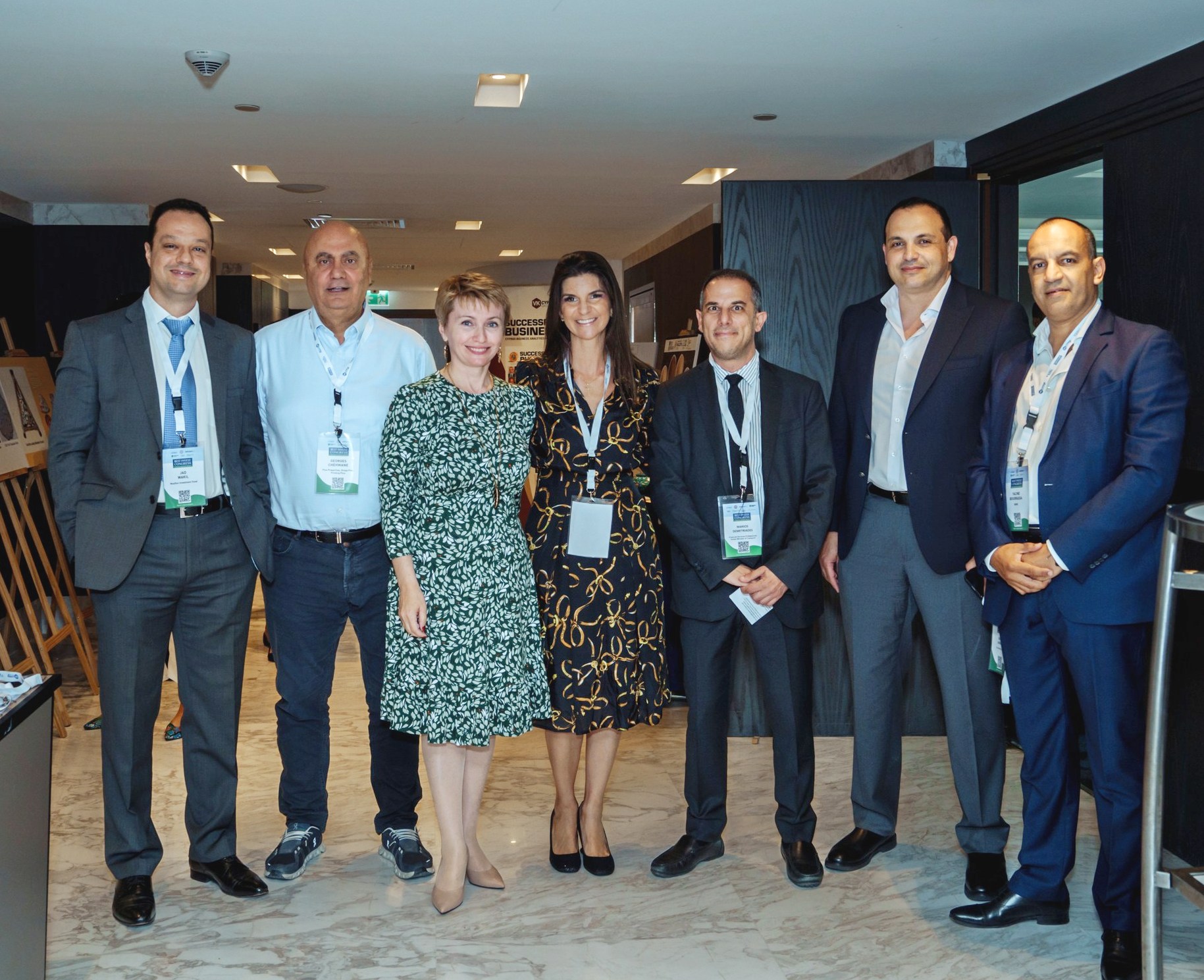
Photo: Successful Business
Некоммерческая организация TechIsland объявила о запуске Школы стартапов ― серии инновационных семинаров, призванных расширить возможности начинающих предпринимателей на Кипре.
Эта новаторская инициатива предлагает возможности для обучения и сотрудничества, говорится в заявлении TechIsland. Первый семинар состоится 9 июня в 16:00 в Лимассоле и будет посвящен теме того, как построить надежную стратегию компании и создать свой бренд. В качестве докладчиков выступят Константин Заполянский, старший директор по инвестициям компании Zubr Capital, и Дарья Ксензова, бренд-менеджер той же компании.
«TechIsland привержен своей миссии позиционировать Кипр как технологический хаб, и поэтому мы очень рады предложить эту возможность стартапам на острове. Эти мероприятия предоставят уникальные практические знания, возможность для нетворкинга и шанс пообщаться с другими новаторами», ― сказал генеральный директор TechIsland Мариос Йоргудис.
Основатель и генеральный директор Zubr Capital Олег Хусаенов сказал, что, инвестируя в технологические компании в течение десяти лет, они стали свидетелями того, как несколько стартапов превратились в единорогов*. «Сейчас благодаря TechIsland на Кипре формируется уникальное сообщество технологических фирм. При наличии правильных компетенций и инвестиций эти предприятия могут стать успешными на мировом уровне», ― сказал предприниматель, выразив уверенность, что инициатива TechIsland принесет свои плоды и позиционирует Кипр как место притяжения талантов.
Участие в семинаре бесплатное. Заинтересованные участники должны зарегистрироваться по ссылке https://bit.ly/3WsJxGE
*Компания-единорог (от англ. Unicorn company) — компания-стартап, получившая рыночную оценку стоимости в размере свыше 1 миллиарда долларов США.
6 навыков эффективного лидера в эпоху перемен
Сектор технологий: самые быстрорастущие компании
Рост числа круизных лайнеров заставил Кипр столкнуться с парадоксом «туриста в круизе». Пассажиры сходят на берег и часто проводят на острове всего несколько часов. Из-за этого их включают не в статистику турпотока, а в число однодневных посетителей. Есть ли от их кратковременных посещений какая-либо выгода кипрской экономике?
Опыт 2022 года показывает, что тысячи иностранцев, решивших сойти с круизных лайнеров на берег даже на несколько часов, не перестают вливать деньги в местные предприятия. Круизные компании предлагают своим пассажирам варианты того, как интересно провести время на берегу. Для желающих заранее зафрахтовывают автобусы. На Кипре пассажирам круизных лайнеров предлагают экскурсии в Лефкару, Ларнаку, центр Никосии, к камню Афродиты, в Курион, Колосси, Хирокитию, Пафос и к другим памятникам и археологическим паркам, не говоря уже о заведениях общественного питания и винодельнях.
Некоторые посетители предпочитают просто гулять по Лимассолу, но при этом тоже приносят доход местному бизнесу. Точные суммы назвать пока невозможно, так как нет официальных данных. Однако Подминистерство туризма хочет привлечь Статистическую службу к тому, чтобы вести учет доходов от однодневных посетителей по тому же методу, что и учет доходов от туризма.
Ожидается рекорд
По данным DP World Limassol, порт Лимассола в прошлом году принял 165 круизных лайнеров с примерно 200 000 пассажиров. Количество пассажиров круизных лайнеров в годовом исчислении увеличилось на 338%.
В этом году управляющая компания также ожидает положительных результатов. Порт готовится принять более 200 круизных лайнеров и около 300 000 пассажиров. В октябре и ноябре будет наибольшее количество прибытий: 34 и 46 лайнеров соответственно. В некоторые дни порт будет принимать по 2-3 круизных корабля в день. Ожидаются посетители в основном из Германии, Израиля, США, скандинавских стран и Великобритании.
300 000 пассажиров — это самое большое число однодневных посетителей с 1980 года. Пока что рекордным по количеству круизных пассажиров остается 2010 год с 271 000 человек. В 2019 году их число составляло 112 268.
Кипрские порты: все флаги в гости будут к нам
Доходы от туризма выросли в полтора раза
Уязвимость экономики Кипра, связанная с частным, государственным и внешним долгом, снизилась, хотя и остается проблемой. К такому выводу приходит отчет Еврокомиссии.
Согласно ему (полностью отчет здесь) уровень долга, включая необслуживаемые кредиты, значительно сократился и, как ожидается, продолжит сокращаться. Актуальной проблемой остается дефицит текущего счета страны. Частный долг сокращается начиная с 2015 года, и, как ожидается, продолжит снижаться в этом и следующем годах, чему способствует рост номинального ВВП. Однако более высокие процентные ставки могут оказать давление на обслуживание долга, поскольку на Кипре преобладают кредиты с плавающей процентной ставкой. На объем частного и внешнего долга влияет присутствие на Кипре компаний специального назначения, которые повышают его уровень, но представляют ограниченные риски для экономики.
Количество необслуживаемых кредитов значительно снизилось в последние годы благодаря их продаже, списаниям, конфискациям имущества за долги и выплатам задолженностей.
Государственный долг тоже неуклонно сокращается. Он сейчас ниже своего допандемийного уровня и, как ожидается, продолжит снижаться в 2023 и 2024 годах.
Несмотря на восстановление туризма, значительный дефицит текущего счета увеличился в 2022 году, что отражает высокий внутренний спрос, а также выросшие цены на энергоносители. Ожидается, что в этом и следующем годах он несколько снизится, но останется значительным.
Ряд мер, включенных в план восстановления и устойчивости, помогут диверсифицировать экономику, поддержат рост экспорта и уменьшат чрезмерную зависимость от импорта нефти. В рамках плана в середине 2022 года был принят пакет поправок к законам о компаниях, занимающихся приобретением кредитов. Улучшая условия работы таких компаний, эти поправки способствуют дальнейшему сокращению объема неработающих кредитов.
После многочисленных продлений в феврале истек срок моратория на конфискацию имущества за долги. Эффективная система отчуждения активов — это ключ к стимулированию заемщиков реструктурировать кредиты, что поможет дальнейшему сокращению их объема, уменьшению частного долга и укреплению платежной дисциплины.
По итогам отчета Кипр был выведен из категории стран с «чрезмерным макроэкономическим дисбалансом» и перенесен в категорию стран где «присутствует макроэкономический дисбаланс».
Министерство финансов приветствовало оценку Еврокомиссии и особенно тот факт, что ЕС признает значительное снижение коэффициента необслуживаемых кредитов и прогнозирует, что это снижение продолжится. «Мы рады отметить, что, по мнению Еврокомиссии, различные меры, реализованные в рамках плана восстановления и устойчивости, сыграли значительную роль в улучшении показателей», — заявили в Минфине.
Статистика внешней торговли Кипра
На Кипре активными темпами сокращается количество банковских служащих и работающих отделений банков. Так сектор старается снизить свои операционные расходы и больше внимания уделять цифровизации.
Количество банковских служащих за год уменьшилось на 988 человек: с 7364 до 6376 работников. Рекордсмены по сокращению штата — Bank of Cyprus (-469 человек) Hellenic Bank (-468 человек). В Alpha Bank сократили 52 сотрудника, в National Bank of Greece (Cyprus) — 17, в CDB Bank — 10, в Ancoria Bank — пятерых сотрудников. Но не все идут этим путем. В Société Générale Cyprus количество сотрудников увеличилось на шесть человек, в Astrobank — на 20 человек, в Eurobank Cyprus — на 13.
В дополнение к сокращению банковских служащих также сокращается число отделений и банкоматов. Наглядно эти данные представлены в таблицах:
Объем необслуживаемых кредитов уменьшился на 60 млн
На Кипре — самый низкий процент по депозитам в еврозоне
Кипрская компания Rofeno Properties Ltd готовится сделать крупную комплексную инвестицию в развитие района Айя-Фила в Лимассоле. Предварительный размер инвестиции оценивается в 856 млн евро.
Предлагаемый компанией проект создает среду смешанного пользования, состоящую из образовательного учреждения, бизнес-парка, жилой застройки, зеленой зоны, социальной, рекреационной и ландшафтной инфраструктуры.
Проект расположится на земельном участке площадью 949 916 кв.м. Он будет включать в себя следующие объекты общей площадью застройки 350 785 кв.м.:
— частная школа,
— реабилитационный центр европейского бренда,
— центр науки и инноваций,
— бизнес-парк с частной зеленой зоной,
— многофункциональный спортивный центр,
— жилой комплекс, который будет включать базовую коммерческую и развлекательную инфраструктуру.
Реализация всего проекта будет осуществляться в несколько этапов и завершится к 2030 году. Школа будет построена в два этапа, первый из которых завершится к сентябрю 2024 года.
Для проекта готово исследование по его воздействию на окружающую среду, оно направлено в профильный департамент.
Компания Rofeno Properties Ltd принадлежит кипрско-израильскому предпринимателю Якиру Габаю, одному из самых богатых людей острова.
Читайте также:
Новый университет и другие проекты кипрского образования
Как изменится район Агиос Афанасиос?
Торгово-промышленная палата Кипра (ТППК) и ее аналог на оккупированных территориях, Турко-кипрская торговая палата (ТКТП), предлагают расширить возможности торговли между двумя частями острова. Один из способов сделать это — открытие новых контрольно-пропускных пунктов на Зеленой линии. Об этом говорится в сообщении Организации Объединенных Наций в твиттере.
Пост появился после встречи между представителями обеих палат при участии специального представителя Генерального секретаря ООН на Кипре Колина Стюарта. По данным ООН, «в центре обсуждения была настоятельная необходимость укрепления экономических и торговых связей по всему острову как способ сохранить перспективу будущего решения кипрского вопроса». «Состоялась открытая и конструктивная дискуссия о создании благоприятных условий для расширения торговли по всему острову, в том числе, за счет особого внимания к молодежи и улучшения условий ведения бизнеса», — говорится в сообщении ООН.
Стороны пришли к выводу, что рост экономической активности между двумя частями Кипра создает хороший деловой настрой и оказывает положительное влияние на жизнь простых людей. В частности, обе палаты решительно поощряют расширение возможностей в коммерческом секторе. Одним из способов добиться этого остается открытие новых контрольно-пропускных пунктов, заявили в ООН.
Напомним, первый КПП на Зеленой линии открылся 23 апреля 2003 года, им стал переход у отеля «Ледра Палас». Сегодня на Зеленой линии действует девять контрольно-пропускных пунктов:
– у бывшей гостиницы «Ледра Палас» (с 2003 года),
– в районе Агиос Дометиос (с 2003 года),
– в селениях Стровилия и Пергамос (с 2003 года),
– в деревне Астромеритис (с 2006 года),
– на ул. Ледра в центре Никосии (с 2008 года),
– в деревне Лимнитис (с 2008 года),
– в селениях Лефка и Дериния (с 2018 года).
Греко-кипрская сторона настаивает на открытии КПП в Коккине и между деревнями Афиену и Луруджина. Турки-киприоты предлагают сделать КПП у отеля «Ледра Палас» доступным для автомобилей. А активисты из межобщинной организации United Cyprus предлагают открыть пункты пропуска у ворот Фамагусты и Пафосских ворот в центре Никосии.
Одним из ощутимых результатов работы КПП действительно стала активизация торговли по обе стороны буферной зоны.
Затяжной кризис изменил потребителей
Прибыль в потребительском секторе удвоилась
Это единственное в своем роде мероприятие будет состоять из дневной бизнес-конференции с высококачественным контентом от международных докладчиков и вечернего музыкального фестиваля на берегу моря.
Фестиваль на свежем воздухе подойдет для всей семьи. Для детей предусмотрена специальная игровая зона, будет работать фургончик с мороженым (со спонсируемым бесплатным «happy hour»), пройдут специальные мероприятия известного образовательного проекта KidIT.
Программа GDCy FEST 2023 включает 4 тематических трека:
• GameDev как бизнес
• Маркетинг в GameDev
• Технологии в GameDev
• GameDev Кипр
Своими мыслями поделятся более 40 спикеров из таких компаний, как Google, Meta, Amazon, Ubisoft, Xbox и других.
Вечером посетителей ждут живые выступления местных групп и приглашенных гостей. Хедлайнером фестиваля станет популярная певица Manizha.
Сохраните дату в календаре: 2 июня в отеле St. Raphael в Лимассоле
Подробная информация и регистрация на сайте www.gdcy.eu/fest.
Издание «Форбс» подготовило список из десяти самых дорогих отелей, которые сейчас выставлены на продажу по всему Кипру.
Это гостиницы и туристические комплексы, некоторые из которых нуждаются в капитальном ремонте. Диапазон цен составил от 1 млн до 11 млн евро.
Отель в районе Маккензи, Ларнака (11 млн евро)
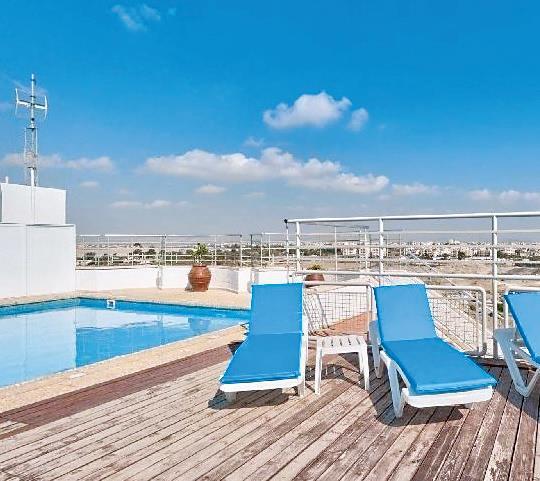
Отель расположен рядом с набережной в районе Маккензи в Ларнаке. Здание состоит из нулевого этажа, мезонина и четырех этажей с номерами, на верхнем этаже расположены бассейн и бар. В отеле в общей сложности 64 номера, общая площадь которых 2240 кв.м. В отеле также есть ресторан и зал для проведения мероприятий вместимостью до 100 человек.
Спа-резорт в Протарасе (6 075 000 евро)
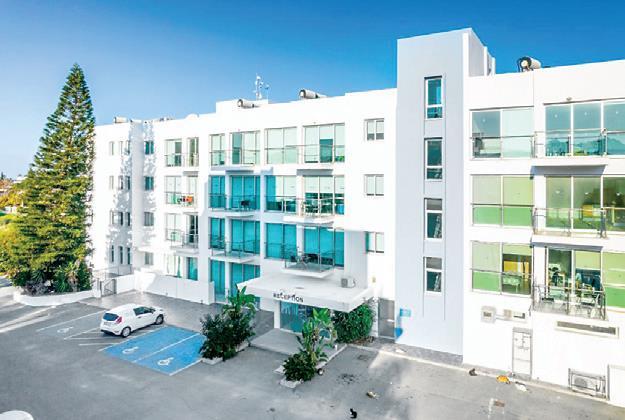
Отель располагает 32 номерами и находится на первой линии, но при этом в центре города. Здесь четыре студии и 28 одно- и двуспальных апартаментов с собственной кухней с видом на море или горы. К услугам гостей два общих бассейна, тренажерный зал, спа-салон и теннисный корт.
Отель в Като Пафосе (5 400 000 евро)
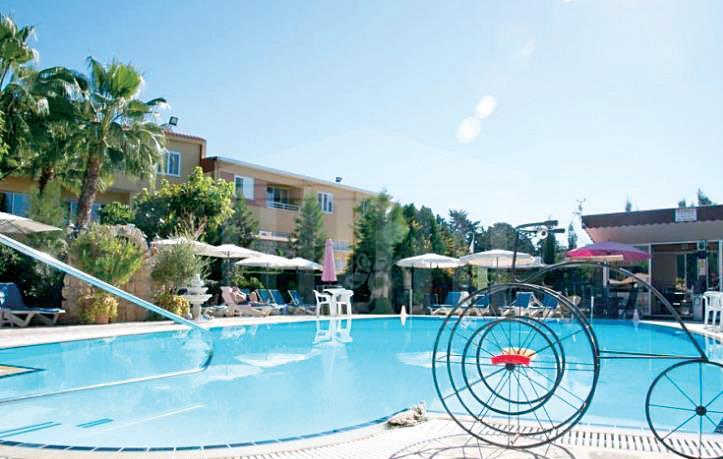
Расположен в самом сердце туристической зоны Като Пафоса, всего в минуте ходьбы от пляжа, порта и крепости. Его общая площадь составляет 3406 кв.м., а площадь земельного участка – 3112 кв.м. В отеле 84 двухместных номера общей вместимостью 168 мест, а также 550 кв.м. мест общего пользования, большой бассейн, ресепшн, бар и ресторан.
Отель в Като Пафосе (5 000 000 евро)
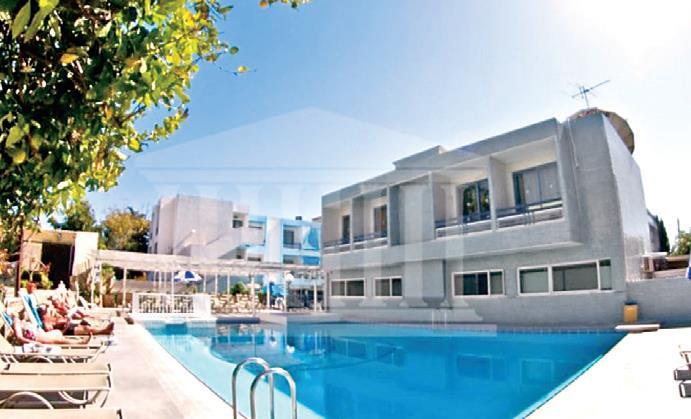
Отель работает с 1995 года, он был частично отремонтирован через несколько лет после открытия. Расположен на четырех участках общей площадью 3785 кв.м. в самом сердце Като Пафоса. Состоит из первого этажа с магазинами, большого бассейна, тренажерного зала и 25 полностью оборудованных апартаментов. Здесь есть также 30 парковочных мест и 1000 кв.м. помещений общего пользования, которые включают в себя ресепшн, лобби, ресторан, бар и лаундж-зону.
Исторический отель в Като Пафосе (5 000 000 евро)
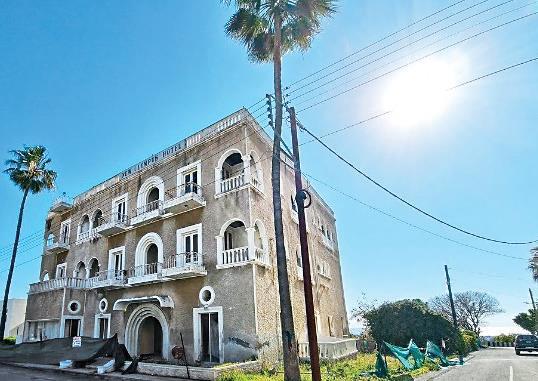
Отель в историческом здании в самом центре Пафоса. Нуждается в капитальном ремонте.
Туристический жилой комплекс в Полисе Хрисохусе (4 500 000 евро)
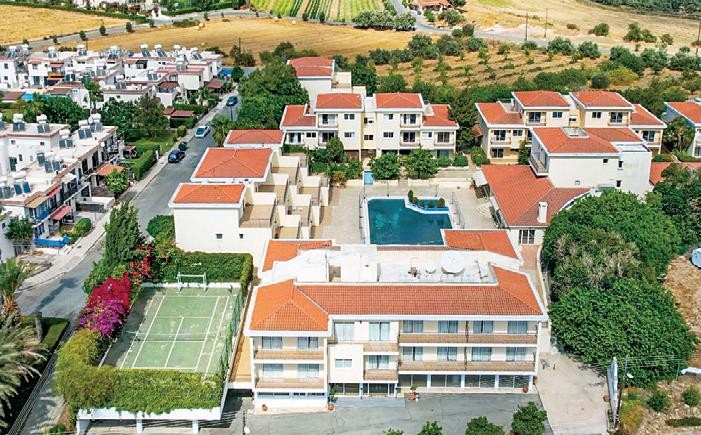
На продажу выставлена доля в размере 84%. Комплекс расположен в 1,5 км от порта Лачи и в 1 км от центра Полиса Хрисохуса. Городской муниципальный пляж находится в нескольких минутах ходьбы. Комплекс состоит из 10 блоков полностью меблированных апартаментов (всего 125 единиц), двух ресторанов, двух магазинов, лобби, бара, теннисного корта, двух игровых площадок для детей – крытой и открытой, двух открытых бассейнов, а также подсобных помещений в подвале. Комплекс был построен в два этапа: в 1990 и 2001 годах.
Двухзвездочный отель в Айя-Напе (3 200 000 евро)
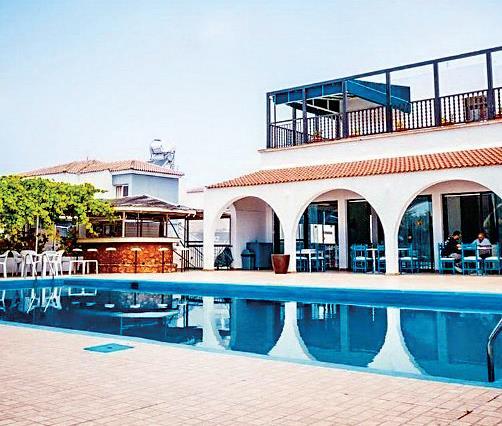
Это отель, который работает с 1985 года и располагает 23 номерами на своих двух этажах. Потенциальный покупатель может добавить еще 22 комнаты на третьем этаже. Отель расположен на земельном участке площадью 1307 кв.м., здесь есть большой бассейн, ресторан и крытая парковка площадью 190 кв.м. Отель нуждается в ремонте.
Туристический комплекс в Полисе Хрисохусе (1 500 000 евро)
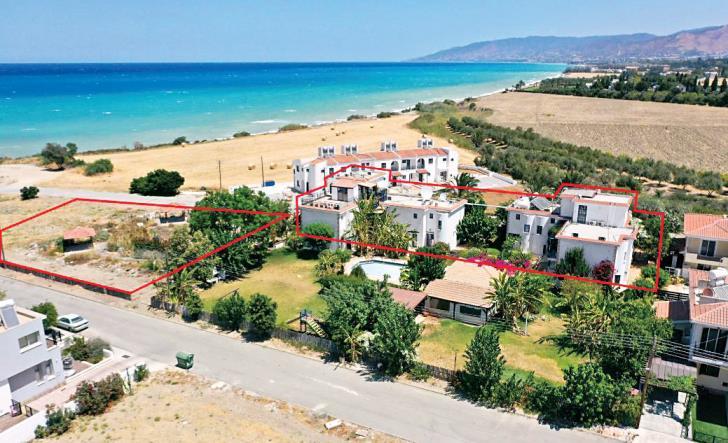
Расположен в 1,5 км от центра города Хрисохус и всего в 150 метрах от пляжа. Комплекс состоит из ресепшена, четырех студий, трех апартаментов с двумя спальнями, девяти апартаментов с одной спальней и подвала. Общая внутренняя площадь составляет 940 кв.м., площадь участка, на котором построен комплекс – 3171 кв.м.
Туристический комплекс в Айя-Напе (1 350 000 евро)
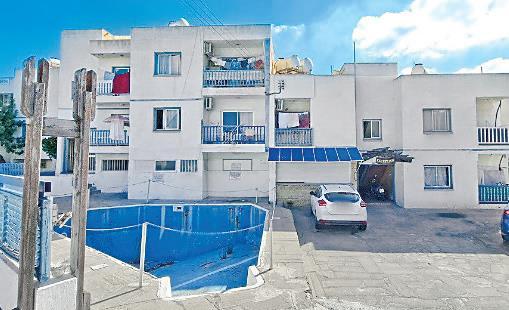
Лицензированный туристический комплекс работает с 1985 года и включает в себя 22 квартиры с двумя спальнями, 14 апартаментов с одной спальней и шесть студий. Он расположен в центре Айя-Напы, в нескольких минутах ходьбы от пляжа и имеет общую площадь 1290 кв.м. Здание нуждается в полной реконструкции.
Апарт-отель в Като Платресе (1 000 000 евро)
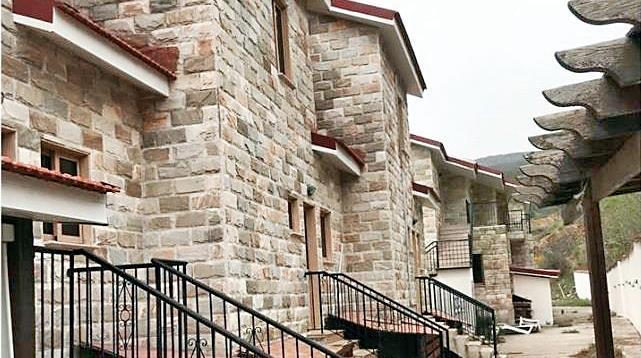
Апарт-отель состоит из одной виллы и трех жилых корпусов. Вилла была возведена в 2001 году и состоит из нижнего этажа и мансарды. Первый корпус представляет собой отдельную жилую единицу с двумя этажами. Второй корпус состоит из трех двухэтажных апартаментов. Третий корпус состоит из восьми квартир, двух апартаментов с двумя спальнями, пяти квартир-студий и офиса. В здании есть подвал, который в настоящее время используется в качестве кладовой, а также общий бассейн и бар.
Израильский холдинг купит отель Grand Resort
Гостиничный бизнес на пути к циклической экономике